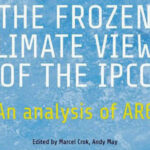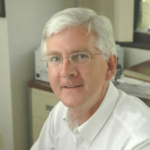
Een van de meest intrigerende personages in climategate is Michael Mann. Ik vind zijn rol zo intrigerend omdat hij ongekend agressief is naar iedereen die het niet met hem eens is (en uit de climategate e-mails blijkt dat dat niet alleen sceptici zijn), hij aantoonbaar grote fouten heeft gemaakt in zijn hockeystick-artikelen en hij er tegelijkertijd toch vrij gemakkelijk in slaagt zijn verworven posities (zijn baan bij Penn State University, zijn rol bij Real Climate, zijn positie in de wetenschappelijke wereld e.d.) te handhaven.
Net als IPCC-voorzitter Pachauri (die aantijgingen over belangenverstrengeling resoluut van de hand wijst) trekt Mann zich weinig aan van kritiek en is zijn respons steevast om keihard terug te slaan, daarbij ad hominem argumenten niet schuwend. In een reactie op een opiniestuk van Patrick Michaels in de Wall Street Journal, waarin Michaels uiteenzet hoe mensen als Mann, Jones en Wigley het peer review proces beïnvloeden, schrijft Mann:
And what about those [skeptics] who are not being published? Every scientist dealing with a major public issue must decide if he or she is going to be a scientist or a de facto politician.
Mr. Michaels and many climate science deniers have opted for the latter course of action. For example, presidential science adviser John Holdren notes that Mr. Michaels “has published little if anything of distinction . . . being noted rather for his shrill op-ed pieces and indiscriminate denunciations of virtually every finding of mainstream climate science.” This makes Mr. Michaels a perfect candidate for a Wall Street Journal op-ed and a decidedly poor submitter to a serious scientific journal.
Politicus
Michaels is dus een politicus, aldus Mann en hij is het daarom niet waard om te publiceren in de wetenschappelijke literatuur. Michaels publiceerde echter wel degelijk in de wetenschappelijke literatuur en zijn artikelen gaan vaak over essentiële vraagstukken in het klimaatdebat zoals ‘attributie‘ (dit artikel bevat fundamentele kritiek op het werk van Ben Santer, wiens paper over attributie een prominente plek kreeg in het tweede IPCC-rapport) en de invloed van economische parameters (zoals GDP) op het patroon van opwarming op aarde. Het laatste artikel schreef hij samen met Ross McKitrick. Hun conclusie is dat de recente opwarming (sinds pakweg 1970) gemeten door landstations zo’n 50% te hoog wordt ingeschat en dat de opwarming in werkelijkheid dus aanzienlijk lager is. Een eerder artikel van Michaels en McKitricks hand met dezelfde strekking kreeg deze reactie in de climategate e-mails:
I can’t see either of these papers being in the next IPCC report. Kevin and I will keep them out somehow – even if we have to redefine what the peer-review literature is!
Boycotten
Dat was Jones aan … Mann in 2004. En het was volgens Michaels niet de enige keer dat het Team not amused was met een artikel van Michaels. In het WSJ-artikel schrijft Michaels:
Messrs. Mann and Wigley also didn’t like a paper I published in Climate Research in 2002. It said human activity was warming surface temperatures, and that this was consistent with the mathematical form (but not the size) of projections from computer models. Why? The magnitude of the warming in CRU’s own data was not as great as in the models, so therefore the models merely were a bit enthusiastic about the effects of atmospheric carbon dioxide.
Mr. Mann called upon his colleagues to try and put Climate Research out of business. “Perhaps we should encourage our colleagues in the climate research community to no longer submit to, or cite papers in, this journal,” he wrote in one of the emails. “We would also need to consider what we tell or request of our more reasonable colleagues who currently sit on the editorial board.”
Wat de e-mails laten zien is dat Mann, Jones en anderen ieder Journal dat een artikel publiceert dat hen niet aanstaat onmiddellijk op een ‘zwarte lijst’ plaatsen. Mann aan Jones in 2003:
This was the danger of always criticising the skeptics for not publishing in the “peer-reviewed literature”. Obviously, they found a solution to that–take over a journal! So what do we do about this? I think we have to stop considering “Climate Research” as a legitimate peer-reviewed journal. Perhaps we should encourage our colleagues in the climate
research community to no longer submit to, or cite papers in, this journal. We would also need to consider what we tell or request of our more reasonable colleagues who currently sit on the editorial board…
Maar nu, als reactie op het WSJ-stuk van Michaels, schrijft Mann heel vroom:
Society relies upon the integrity of the scientific literature to inform sound policy. It is thus a serious offense to compromise the peer-review system in such a way as to allow anyone—including proponents of climate change science—to promote unsubstantiated claims and distortions.
The good news is that it is not happening today in relation to either climate scientists or the deniers of climate science. Men and women who have dedicated their lives to advancing science need not apologize for keeping their rigorous professional journals free of the pollution of what is purely politics.
Deze alinea’s kunnen over een tijdje (als het klimaatdebat geluwd is) een mooi plekje krijgen in de geschiedenisboeken. Mann beweert hier met droge ogen dat er geen ongefundeerde claims in de literatuur zijn verschenen. Zullen we eens beginnen met zijn eigen hockeystickgrafiek? De titel van zijn reactie in de WSJ was overigens: Science Journals Must Be Unpolluted by Politics. Voor hem staat het dus – ondanks alle uitlatingen in de climategate e-mails – vast dat hij en zijn collega’s behoren tot tot de ‘Men and women who have dedicated their lives to advancing science’ terwijl anderen, zoals Michaels, overduidelijk politiek bedrijven.
Intrigerend
Climate Audit verwees gisteren naar een intrigerende passage in een e-mail in 2003 van Mann aan een hele groep Teamleden. Het was aan de vooravond van de eerste paper van McIntrye en McKitrick in Energy & Environment in 2003 (MM2003). Mann had via zijn netwerk de hand weten te leggen op een aankondiging van een (onbekende) klimaatonderzoeker over de MM2003 paper:
two people have a forthcoming ‘Energy & Environment’ paper that’s being unveiled tomoro (monday) that — in the words of one Cato / Marshall/ CEI type — “will claim that Mann arbitrarily ignored paleo data within his own record and substituted other data for missing values that dramatically affected his results.
When his exact analysis is rerun with all the data and with no data substitutions, two very large warming spikes will appear that are greater than the 20th century.
Personally, I’d offer that this was known by most people who understand Mann’s methodology: it can be quite sensitive to the input data in the early centuries. Anyway, there’s going to be a lot of noise on this one, and knowing Mann’s very thin skin I am afraid he will react strongly, unless he has learned (as I hope he has) from the past….”
Een onbekende ‘insider’ zegt dus in 2003, voordat het hele hockeystickdebat goed en wel is losgebarsten, dat de meeste mensen wel weten hoe gevoelig Mann’s reconstructie is voor invoerdata, een punt dat McIntyre tot op de dag van vandaag ’tevergeefs’ probeert te maken. Daarnaast is het de insider dan dus al bekend dat Mann een kort lontje heeft.
Zonder de MM2003 gezien te hebben schrijft Mann aan diverse Teamleden:
The important thing is to deny that this has any intellectual credibility whatsoever and, if contacted by any media, to dismiss this for the stunt that it is..
Het liep anders voor Mann, want juist deze paper bracht de zaak uiteindelijk aan het rollen en leidde tot de GRL paper van McIntyre en McKitrick in 2005.
Mag ik een teiltje?
Dat Mann zelfs door zijn directe collega’s niet zo gewaardeerd wordt als naar buiten toe lijkt, blijkt nergens duidelijker dan in deze doorgestuurde mail van hockeystick coauteur Bradley aan Briffa:
From: “Raymond S. Bradley” <rbradley@xxxxxxxxx.xxx>
To: k.briffa@xxxxxxxxx.xxx
Subject: vomit
Date: Fri, 14 May 1999 07:25:34 -0400Excuse me while I puke…
Ray
Dit was al in 1999 en als reactie op een mail van Mann waarin hij alle betrokkenen rond het hockeystick-artikel bedankt voor de goede samenwerking. Ondanks de weerzin die Mann blijkbaar oproept bij zelfs directe collega’s, ondanks zijn wilde manier van om zich heen slaan naar iedereen die een andere visie heeft dan hijzelf, zit Mann stevig op het pluche en wijst niets erop dat hij binnenkort van zijn ‘voetstuk’ zal vallen. Van het onderzoek dat Penn State naar hem heeft ingesteld hoeven we – vrees ik – wat dat betreft ook niet veel te verwachten.
En dat is volgens mij het werkelijke probleem dat climategate blootlegt. Van wetenschap wordt altijd gezegd dat het zelfreinigend is en volgens mij is het dat ondanks alle ‘wantoestanden’ die blijken uit climategate ook nog steeds. Het zou alleen helpen (het zelfreinigende vermogen van de wetenschap sterk versnellen) als de grote kudde van klimaatonderzoekers, zich openlijker zou uiten tegen onderzoekers als Mann. Door zijn gedrag te gedogen dragen ze in feite zelf een steentje bij aan de ‘deplorabele’ staat waarin het klimaatonderzoek zich op dit moment bevindt.
Nek uitsteken
Ik vrees dat er echter weinig onderzoekers zijn die hun nek durven uitsteken. Wie dat wel doet zoals Judith Curry van Georgia Tech, hoeft immers niet te rekenen op een goedkeurend schouderklopje. In een van de commentaren op Climate Audit schrijft Curry:
Many climate researchers haven’t been paying that much attention to climategate: they have certainly heard about it, most likely haven’t delved into any of the actual emails, and are mainly glad it wasn’t their emails that were hacked since they use the word “trick” also. This impression of mine is gleaned through interactions over the past month at a NASA science team meeting and at AGU. I note that my interactions with other scientists on this topic may be unusual owing to my possible “pariah” status owing to my public statements on this topic (i.e. “Curry’s career is over”)
Being a “pundit” on this issue requires a fair amount of homework, in terms of reading the emails, keeping up with the blogs, etc. Most climate researchers probably don’t want to bother with this level of effort, and prefer to keep doing their research. You would be amazed at how many climate researchers never look at any of the climate blogs and are mostly unaware of them.
De bully tactics van Mann c.s. zijn er niet alleen op gericht om sceptici buiten de literatuur te houden maar weerhouden integere mainstream onderzoekers (de meerderheid) er ook van om zich uit te spreken tegen de wantoestanden die gaande zijn, als ze er al van op de hoogte zijn. Het antwoord op de titel van dit stuk ‘Wanneer roept de gemeenschap Mann een halt toe?’ is dan ook helaas: voorlopig niet.
[update 6 januari] Zoals Hajo in een commentaar aangeeft reageerde Michaels gisteren in de WSJ weer op de reactie van Mann. Zijn reactie is interessant genoeg om hier integraal over te nemen. Zijn belangrijkste punt is dat er wel degelijk overtuigend bewijs is dat sceptici – en ook de volgens Mann wel acceptabele John Christy – gedwarsboomd worden bij het publiceren in de wetenschappelijke literatuur:
Michael Mann’s Dec. 31 Letter to the Editor, “Science Journals Must be Unpolluted by Politics,” states that I falsely claimed that work by me and “other fossil-fuel-funded climate change contrarians” has been “unfairly blocked . . . from appearing in mainstream science journals.”
In fact, this started nearly 20 years ago, when Stephen Schneider, the editor of Climatic Change, rejected a manuscript of mine reconstructing upper-air data, saying that its “counter-paradigm” nature required that it be subject to more vigorous peer review than other submissions.
Prof. Mann claims that other “skeptics” (whatever that means), such as University of Alabama’s John Christy, have “no problem” with the mainstream journals. Prof. Christy recently documented a remarkable series of publication irregularities directed against him and other scientists, revealed in the climategate emails (www.americanthinker.com/2009/12/a_climatology_conspiracy.html).
Recently, Roger Pielke Jr., director of the University of Colorado’s Center for Science and Technology Policy Research, noted a series of “effort[s] by activist climate scientists to stage-manage the peer review process much like how one might manage a partisan blog for public consumption.” One of his sources is again climategate, which is rife with threats to boycott a journal that dared to publish papers that Prof. Mann and his friends disagreed with.
In passing, I would note that the University of Virginia, where I worked for nearly 30 years, has rather rigorous standards for promoting scientists like myself through the academic ranks. Instead, Prof. Mann cites President Barack Obama’s science adviser John Holdren as an authority on my work, all the while arguing for keeping science “unpolluted by politics”!Patrick J. Michaels
George Mason University
Fairfax, Va.






Sterk verhaal! Hier nog de officiele reactie van Michaels op Mann in WSJ: http://online.wsj.com/article/SB20001424052748703…
Hierbij mijn reaktie, zoals gepost op de site van Tom Fuller
http://www.examiner.com/x-9111-SF-Environmental-P…
Dear Tom,
Thanks for your commitment to try to reshape the landscape back into normal human understanding.
My major question is: when do you qualify as a climate scientist? Since not being a climate scientist is the most frequent rebuttal read on Realclimate and other AGW fansites to people who raise their voice with very sound objections to the "settled science".
My suggestion:
1. Political bias colours all your experiments and data handling.
2. A moronic understanding of biology.
3. A medieval understanding of physics.
4. Unawareness of chemical sciences.
5. Ad libitum cherry picking of statistical methods.
6. A galactic ego.
7. Refusing to share methods, data.
I am afraid I do not fulfill any of these requirements.
I do not qualify as a climate scientist, and I am proud of that.
je moet de sterk afwijzende reaguurders eens lezen op de wallstreet journal (http://online.wsj.com/article/SB10001424052748703478704574612400823765102.html)
Een uitnodiging om te reageren op climategate had Mann afgewezen, en nu ging ie als reactie op Michaels de vermoorde onschuld spelen.
Die mann wordt afgemaakt…!